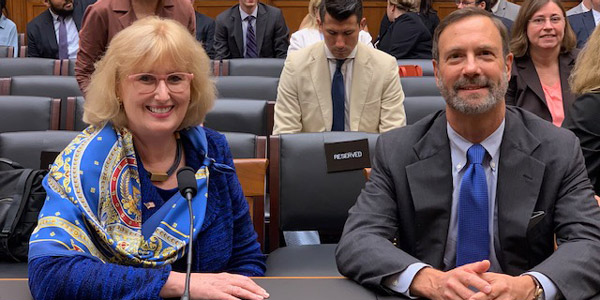INTA News
INTA Member Advocates for Lanham Act Amendment before U.S. House Judiciary Committee
Published: July 22, 2019

USPTO’s Commissioner for Trademarks Mary Boney Denison (left) and Peter Brody (Ropes & Gray LLP), who serves as Chair of INTA’s Legislation and Regulation Committee’s U.S. Subcommittee, delivered testimony centered on a request for Congress to introduce legislation amending the Lanham Act on Thursday, July 18, in Washington D.C. before the United States House Committee on the Judiciary.
INTA participated in a Congressional hearing held by the United States House Committee on the Judiciary titled “Counterfeits and Cluttering: Emerging Threats to the Integrity of the Trademark System and the Impact on American Consumers and Businesses,” on Thursday, July 18, in Washington, D.C. The hearing took place before the Subcommittee on Courts, Intellectual Property and the Internet.
Peter Brody (Ropes & Gray LLP), who serves as Chair of INTA’s Legislation and Regulation Committee’s U.S. Subcommittee, delivered testimony on behalf of INTA. His testimony centered on a request for Congress to introduce legislation amending the Lanham Act-the federal statute that governs trademarks, service marks, and unfair competition.
Mr. Brody argued that the Lanham Act should be amended to reestablish “an endangered but vital” principle-the assurance that injunctive relief is available in “appropriate cases involving trademark counterfeiting, infringement, dilution, false advertising, and cybersquatting.” The amendment would “clarify and standardize enforcement of the Lanham Act across the country to safeguard the interests of American consumers and businesses,” he said.
INTA passed a Board Resolution in May 2017 to address inconsistencies in the U.S. federal courts’ application of the rebuttable presumption of irreparable harm. The resolution called for the Lanham Act to be amended so as to provide that, when a claimant seeks injunctive relief under Section 34 of the Act, a rebuttable presumption of irreparable harm will apply where there has been a finding of liability, or in the case of a motion for a preliminary injunction, a finding of probable success on the merits of the claim.
In his testimony, Mr. Brody explained this issue to Members of Congress and illustrated how businesses and consumers are adversely affected, noting that, “trademarks are invaluable to the owners of businesses large and small. They identify a particular source in a crowded marketplace, enabling businesses to develop a reputation and goodwill, symbolized by their brand.” He went on to explain how goods or services sold under infringing and confusing trademarks weaken consumer trust in quality and consistency.
Coming full circle, Mr. Brody highlighted recent developments in Lanham Act remedies that have resulted in “federal court rulings that hinder trademark owners’ ability to obtain relief,” which, he argued, “threaten to undermine Congressional objectives in protecting both consumers and businesses from harm.”
Members of Congress expressed an interest in learning more about this issue and in understanding how this issue affects consumers and their engagement with brands.
The hearing also included testimony from USPTO’s Commissioner for Trademarks Mary Boney Denison, who focused on the agency’s initiatives to maintain the integrity of the U.S. Trademark Register. “The recent rise in improper trademark submissions and bad faith behavior are very concerning, as is the proliferation of counterfeit goods in the marketplace,” Commissioner Denison said. She used this opportunity to outline technology strategies that the agency is exploring to help assist with examination as well as the role of a task force that is focused on fraudulent filings.
The hearing included testimony from several additional witnesses from other organizations who focused on the challenges to consumers and businesses presented by counterfeiting.
The hearing illustrated the interest of bipartisan Members of Congress in learning more about the challenges facing the trademark community and opportunities for Congress to engage in a dialogue with stakeholders about initiatives and ideas to solve these challenges with the goal of protecting consumers, supporting businesses, and enhancing the economy.
INTA will continue its direct and focused advocacy for this legislative change.